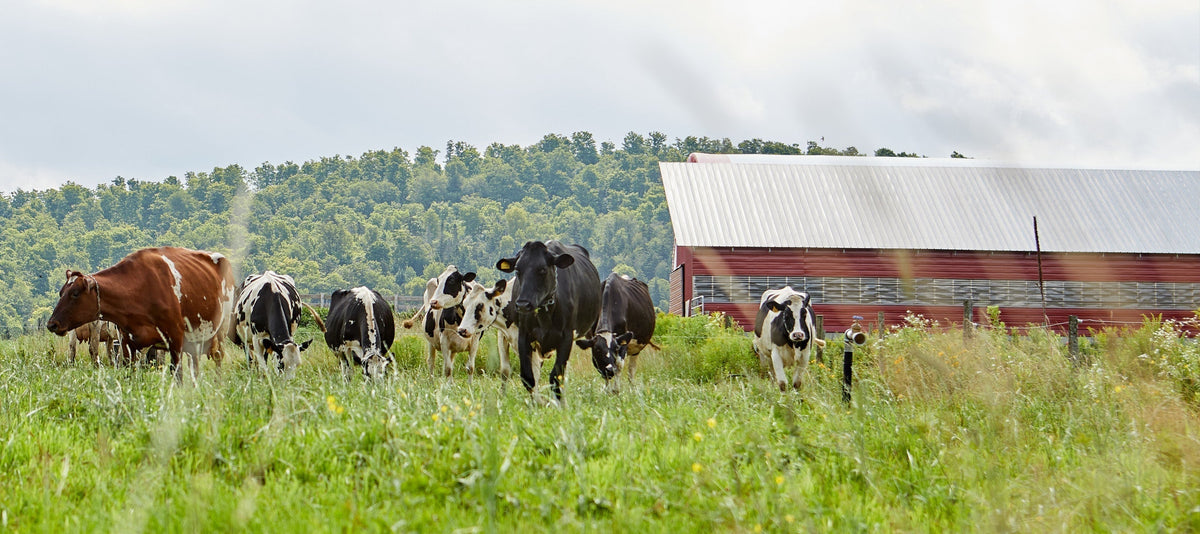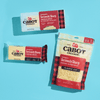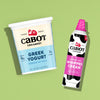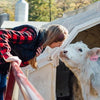
Sweet Rowen Farmstead
Back before Paul Lisai established his own milking herd and creamery, he worked for several farms in Vermont—and even New Zealand—learning the ropes of the dairy business. Along with all the practical knowledge he gleaned, Paul also landed on a name for his eventual business. “The old farmers would say, ‘Go get a bale of rowen for the calves,’” he explains, referring to the second cut of sweeter, finer hay that grows in after the first haying of the season.
Paul’s Sweet Rowen Farmstead (say row like cow) began with eight cows in 2011, a few years after he graduated from college with an agro-forestry degree. Though he grew up in Vermont, farming wasn’t a part of his upbringing. But while attending Sterling College in the Northeast Kingdom region of Vermont, he realized a small dairy operation could be the ideal way to meet his goals of making a sustainable, regenerative livelihood from the land.

“Dairy is the most vibrant agriculture community in Vermont,” Paul explains. “It’s a lot of work but cows give milk every day and you can make a living 365 days a year. It goes back to community and tradition and a constant connection to the land.”
Now firmly established on 160 acres in West Glover, Vermont, Sweet Rowen has grown significantly over the years. The farm now milks around 60 cows and works with 300 acres of crops and 200 acres of pasture, a mix of both owned and leased land.
But it’s not just the farm’s expansion that’s impressive—it’s the exceptional quality of the milk. In 2024, Sweet Rowen was awarded the Best Quality Milk Award for all of Vermont, a significant honor that Paul sees as a “lifetime achievement” for the farm. The award is based on rigorous state testing that measures somatic cell count, a critical indicator of milk quality, and is a true testament to the farm's meticulous attention to detail and dedication to excellence.

“We don’t specifically work for awards like this, we just do what we do,” Paul reflects. “But we focus on quality, and it pays off. We make sure the right practices and facilities are in place, and everyone’s committed to doing the right thing every time. It’s all about being detail-oriented and intentional—because when the milk is exceptional, everything we make from it is, too. That’s the standard we hold ourselves to. And to be recognized for that feels good.”
Alongside this commitment to quality, Paul has been working to sequester as much carbon as possible on the farm with no plowing or tilling. By practicing rotational grazing, the farm helps pull carbon out of the atmosphere and lock it into the soil. In fact, Paul has seen a 0.5-1% increase in organic matter in the soil every year, whereas with tillage, you have the potential to lose organic matter every year because you’re letting some of the carbon out. The farm also added a new compost pack barn for the cows, which is a big greenhouse barn where they add organic material like hay twice a week. “You’re locking up all your nutrients in carbon so you don’t have slurry manure to deal with. And then all those materials stay locked in and we can later spread on the pastures and fields,” Paul explains.
The farm also utilizes a large irrigation system that captures runoff from the milk house. With the help of various pipelines, this runoff is used to irrigate pastures in the summer, especially during droughts, which helps conserve resources while maintaining healthy soil.

Sweet Rowen’s herd of Vermont Heritage Linebacks—a distinctive landrace breed derived from the Randall Lineback but evolved naturally on Vermont pasture—continues to thrive. The farm is proud to maintain a closely managed, pasture-based diet of fresh grass and hay for the cows, ensuring their health while supporting the regenerative health of the land.
All this attention to quality care and sustainable practices pays off in the farm’s products. Sweet Rowen’s value-added dairy products, including cream-top whole milk, yogurt, and a variety of fresh and aged cheeses, are sold throughout the green mountain state as well as nearby neighbors like Albany, NY and New Hampshire. The creamery now produces 16 different types of cheese, including feta, a wide-variety of cheddars, and spreadable cheeses flavored with herbs, garlic and tomato, and even nettles. The farmer’s favorite? Freedom Heights Alpine Cheese. “We call it Freedom Heights, named after our region of Freedom Heights Farmers because of its 1,600-foot elevation. So this cheese really reflects our area—based on the cows, the place, and the rugged terrain of the land,” explains Paul.
If you’re looking for something softer, Sweet Rowen offers a variety of bloomy rind cheeses, including the creamy, award-winning Mountain Ash. The cheese's ash-dusted rind gives a nod to traditional cheesemaking along with subtle smokiness and a rustic look. Want harvest vibes? Red Sky is dusted with smoked paprika creating a red and white mottled rind and a light smokey and earthy flavor. And for a simple, buttery taste with nothing added, check out Storm, a bloomy rind cheese in its purest form named after the farm’s first cow.

In addition to its wide range of cheese, good ol’ fashioned milk is thriving. “We’re seeing more people going back to whole milk, which is exciting for us,” says Paul. “Even major corporations are making moves to offer more dairy products, and the shift toward whole milk is something we’ve been observing for a while. It’s a great time for the industry.”
While Sweet Rowen Farmstead offers a full line of products, being a member of the co-op has always been an important part of its business since inception, which is something Paul is hugely appreciative of. “The relationship with Cabot has always been a great balance for our business,” he says. “It gives us steady income, but it also supports us in ways like marketing, milk testing, and more. For example, every other day I get a text from Cabot with the components of our milk that day. The co-op’s resources have been invaluable to us.” And it’s not just about business, it’s about the community, he explains. “There’s a real community aspect of it and I have a lot of pride in the Cabot brand—as much as my own brand.”
Beyond the farm’s daily operations, Paul is excited about future plans to strengthen the farm's role in the local community. “Now that the farm is well-established, we’re focusing more on engaging the public,” he says. “We’re looking into hosting more events, like ‘coffee with the cows’ or farm-to-table dinners, where people can come and learn about agriculture firsthand.”
Sweet Rowen Farmstead’s commitment to quality and sustainability continues to grow, and with each step, they’re leaving a lasting, positive impact on the land, the community, and the dairy industry at large.













